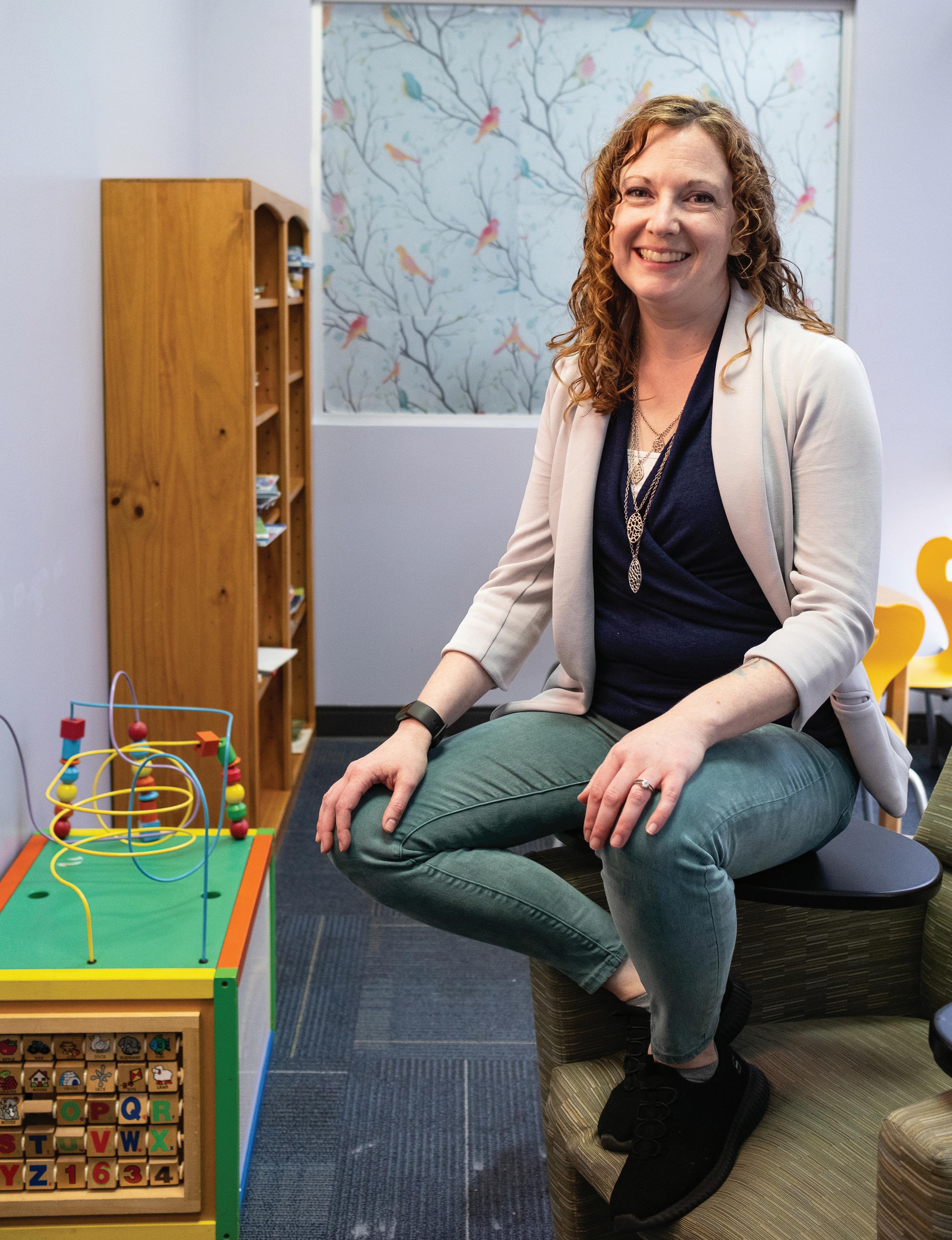Helping Hands
As pediatric mental health diagnoses continue to climb, physicians and counselors are expanding services and increasing outreach to help combat the crisis.
Sarah and Aaron Silverman know that growing up can be stressful. And they know they can’t completely protect their young son and daughter from a very worrisome world. So, the Worthington couple is doing their best to give Ethan, 8, and Madelyn, 5, the tools to manage stress and anxiety whenever it crops up.
“I’ve struggled with depression and anxiety, so it’s something we’re always worried about,” says Sarah Silverman. “I say, ‘Let me arm them with the best emotional intelligence and tools that I can.’ ”
Their concerns are shared by parents, health care workers, teachers and government officials nationwide and are borne out by concerning statistics. According to the National Institutes of Health, one in five children has a “significantly impairing mental disorder.”
A survey of 500 parents conducted in March by the Kids Mental Health Foundation at Nationwide Children’s Hospital found 70 percent of parents and caregivers are concerned about their children’s mental health and wellness. A 2023 national survey by the Harris Poll found that half of parents with children younger than 18 felt that social media had negatively impacted their children’s mental health in the last year.
While the pandemic exacerbated pediatric mental health issues, there was a treatment crisis long before kids had to isolate in their homes because of COVID-19, says Dr. David Axelson, chief of psychiatry and behavioral health at Nationwide Children’s Hospital. “COVID made things worse, especially with anxiety and depression, and we are trying to catch up with the need,” he says. In 2019, the year before the pandemic hit, Nationwide Children’s opened the Big Lots Behavioral Health Pavilion, the hospital’s first freestanding facility dedicated to treating mental health. The nine-story building consolidated and expanded services that had been scattered around the hospital complex and includes a psychiatric crisis center, a 16bed crisis stabilization unit, 38 inpatient
By Kathy Lynn Gray
beds and intensive outpatient programs.
The need for care, Axelson says, is reflected in the ongoing increase in calls to the hospital’s service line: In 2023, 44,000 calls came in for mental health concerns, compared with 19,000 a decade earlier. Patient counts are rising, too, as measured by the number of total inpatient days spent at the hospital. The pavilion recorded 9,000 patient days in 2019, more than 13,000 in 2023 and is projected to reach 14,500 this year.
Axelson says he has noticed an increase in children suffering from behavioral dysregulation with aggression, which can cause people to react disproportionately to everyday stress. Unfortunately, these feelings sometimes are directed at those trying to help. “Patient aggression towards staff is a significant problem that has gotten worse in the last five years,” he says.
The problem has had serious ramifications. The U.S. Department of Labor cited the hospital in May 2023 stating it had failed to protect pavilion employees from patients and levying $18,080 in penalties after investigating a November 2022 complaint filed with the Occupational Safety and Health Administration. “Employees, including nurses and mental health specialists, were exposed
to workplace violence in the form of repeated and consistent exposure to violent attacks from patients which resulted in serious injuries,” the DOL stated. Nationwide Children’s contested the penalties and the case is ongoing, according to Scott Allen, regional director for public affairs and media relations for the DOL. Spokesperson Audrey Hasson says via email that the hospital continues to work with OSHA but cannot comment on specifics. “The safety of our staff and that of the children and families we serve is our highest priority,” she writes.
Reaching More Children
Since opening in 2019, the pavilion has expanded its offerings, increasing intermediate levels of care and intensive outpatient services, and embedding mental health services into the hospital’s community care clinics. It has reduced the wait time for inpatient beds, but the facility does sometimes reach capacity.
Axelson says the goal is to help children and young adults in the early stages of mental health issues to prevent the need for more intensive care. “Being able to provide services that can get kids back home and back in the community is really important and is something we’ve been able to do,” he says.
The Big Lots Behavioral Health Pavilion at Nationwide Children’s Hospital
One newer service is OhioRISE, for children and young adults up to age 20 who have significant behavioral health treatment needs. Operated through the Ohio Department of Medicaid with several partners, including Nationwide Children’s, the $1 billion program was rolled out in 2022. Its goal is to provide better access to mental health care at home and in the community so participants can stay with their families. The program, which originally served 5,500 young people, now has nearly 38,000 enrolled around the state.
“Resources are out there, although often not enough and with barriers,” says Maggie Dangler, site manager of the Hilliard-area office of Syntero, a nonprofit Central Ohio counseling services provider. “But don’t wait to get services until your child is at that higher level of need.”
In addition to individual counseling, Syntero provides on-site services for 11 school districts in Franklin, Delaware and Morrow counties. In Delaware and Morrow, the organization recently launched same-day access so any child can get an immediate mental health assessment.
Anxiety and depression are the most prevalent issues Syntero counselors see, Dangler says, pointing to the “constant onslaught of access to peer pressure through social media” as one cause. “Bullies can always get through to you through Snapchat or Instagram,” she says. “But we need a lot more research to find out why [more mental health issues] are happening.”
Dr. James Duffee, who has been both a pediatrician and a child psychiatrist for 45 years in Dayton and Springfield, attributes the increase to a wide range of causes: social media, electronics, obesity, alcohol and marijuana use, and community violence, particularly at schools. “Kids have to have active shooter drills, and they feel like there’s no place that’s safe,” he says. “But I think the largest issue is the disintegration of social safety nets like churches and scouting, where children learned a sense of virtue and value. And the polarization of people— kids pick up on that and feel like this is not a safe time.”
Duffee, who retired from clinical care and is now a consultant for the Ohio Department of Health, reminds parents that children pick up on adults’ anxieties. “They need to make sure they’re not
‘‘ We want people to know what tools can help mental health so they can start conversations about this with every child—not just those we’re worried about.”
ARIANA HOET, EXECUTIVE CLINICAL DIRECTOR OF THE KIDS MENTAL HEALTH FOUNDATION
sharing that anxiety with their kids,” he says. “Kids need a stable, secure base that they can go back and touch, so they can feel secure when they go out into the world.”
Enlisting Primary Care Providers
Duffee has been helping the health department develop the Ohio Pediatric Mental Health Care Access program.
ODH Director Dr. Bruce Vanderhoff says the program, funded with a federal grant, will provide education, psychiatric consultations and a referral network to help doctors, nurse practitioners and physician’s assistants who treat children. “We need to do a better job of supporting mental health care delivery through primary care,” he says. “A lot of behavioral health care is sought for children through their primary providers, because it’s a safe environment without stigma.”
Vanderhoff says the program will roll out in 2025 and offer peer-to-peer consultations with psychiatrists; training so that primary care providers can better assist children with their mental health; and a community referral network with a broad array of behavioral health providers.
Duffee says similar programs are offered in most states, based on a model that began in Massachusetts 15 years ago. “Part of the idea of these programs is to do a risk assessment and tide the child over with adequate care until appropriate care can be given,” he says. “Another is to build competency among community practices so children will be cared for close to home and away from highcost facilities.”
Dr. Jordee Wells, an assistant professor of pediatrics in the emergency medicine division at Nationwide Children’s and
Ohio State University’s College of Medicine, encourages pediatricians to screen all children for mental health issues during annual wellness checks.
As an ER physician, she is well aware that suicide is the second-leading cause of death for 10- to 25-year-olds in the United States. And because 82 percent of young people who kill themselves with a firearm use one from their home, she’s involved with the Store It Safe program, established in 2015 by the American Academy of Pediatrics. Since its inception, the program has distributed 3,500 firearm lock boxes, often through primary care doctors, and provided training to health care workers and information to families about gun safety, depression and suicide risks.
“I hope parents are having open conversations at home with their children about this, so they can share if they’re having any problems, and we can address those,” Wells says. “We also have to be mindful of what our children have access to: firearms, medications, recreational drugs and alcohol.”
Parents also should be aware of the Mobile Response and Stabilization Program for youth up to age 21, Wells says. The service, which is available 24/7 for families of young people who are experiencing a severe mental health crisis, is an alternative to calling police that can provide immediate de-escalation and stabilization. Calls to the program at 888-4186777 typically receive a response within an hour.
On Our Sleeves Initiative Expands
One well-known children’s mental health program, On Our Sleeves, underwent a major change in April. The 6-year-old campaign by Nationwide Children’s Hospital to reduce the stigma around mental health diagnoses was folded into the Kids Mental Health Foundation.
On Our Sleeves will continue its work, coupled with the foundation’s free resources to increase mental health knowledge and bolster wellness habits. “We want people to know what tools can help mental health so they can start conversations about this with every child—not just those we’re worried about,” says psychologist Ariana Hoet, executive clinical director of the foundation.
The foundation offers more than 500 free guides, videos and articles for parents, caregivers, coaches and teachers,
plus resources for teachers on subjects including bullying and test taking. The information is “in the upstream space,” says Hoet, and is meant to catch problems early and provide tools to promote mental wellness.
The foundation also shares its resources with other hospitals, youth organizations and camps, Hoet says, and recently established a program to help television and film scriptwriters accurately depict children with mental health issues.
Nationwide Children’s also added a research arm to its work on children’s mental health this year. The Institute for Mental and Behavioral Health Research was set up at the pavilion to study the causes of pediatric mental health conditions, as well as prevention and treatment. The Center for Suicide Prevention and Research is part of the institute, which also works with several departments at Ohio State University.
Another expansion of mental health help for young people is taking place at the Buckeye Ranch, a nonprofit that has provided emotional, behavioral and mental health services since 1961. In collaboration with Nationwide Children’s, the ranch is adding a new 57,000-squarefoot facility on its main campus in Grove City for patients who have been hospitalized and need intensive transitional care. The 48-bed residential treatment center is scheduled to open next year.
How Parents Can Help
Although the Silvermans’ children are young, the couple knows that their mental health isn’t something to be ignored.
“We definitely talk plainly with them
about our emotions and try to normalize all the emotions,” says Sarah Silverman. “They see me cry, they see me frustrated, they see us fight but they see how we move on from that.”
The Silvermans try to limit the amount of television news their children see and how long they watch TV each day. “But what’s more important than how much time they’re watching TV or how much time they’re on a tablet is knowing as a parent what they’re watching,” she says.
As a teacher of special-needs preschoolers, Sarah Silverman sees how anxious parents can be, and she sees how that anxiety passes to their children. “If their mom is worried, they’re going to be worried, too,” she says.
Syntero’s Dangler says parents need to be flexible but firm, particularly as children get older. “Plant the seeds early about how to exist in a world of technology,” she says. “Have conversations around it and let them know they don’t have to totally navigate things on their own. Tell them that if there’s a problem, they can come to you. Come at their questions with curiosity and compassion, not with anger.”
Sarah and Aaron Silverman plan to do just that.
“There’s such a small amount of time that kids can live in a world that feels carefree, and I feel like this generation isn’t getting any of that,” Sarah Silverman says. “There’s just a lot of hate and distrust in the world, and that’s trickling down. What happened to the idea of being innocently happy because you’re 4 and your life consists of just playing and more playing?” ◆
RESOURCES FOR PARENTS & CHILDREN
On Our Sleeves/Kids Mental Health Foundation kidsmentalhealthfoundation. org/mental-health-resources/ parents
CDC mental health basics cdc.gov/childrensmental health/basics
American Academy of Pediatrics tip sheets aap.org/en/patient-care/ mental-health-initiatives/ mental-health-resourcesfor-families/
Store It Safe Program ohioaap.org/storeitsafe
Ohio Rise managedcare.medicaid.ohio. gov/managed-care/ohiorise
CRISIS RESOURCES
Mobile Response and Stabilization Services 888-418-6777; mrssohio.org
Ohio Crisis Text Line
Text 4hope to 741-741 for 24/7 help from a crisis counselor within 5 minutes. All ages.
HELP IN A CRISIS
• For suicidal thoughts, go to the emergency room or call the 988 Suicide & Crisis Lifeline at 988.
• Call the Nationwide Children’s Hospital and Franklin County Youth Psychiatric Crisis Line at 614-722-1800.
• Outside Franklin County, call your county psychiatric crisis line or behavioral health care provider.
Dr. David Axelson of Nationwide Children’s Hospital
Factory Tours
Get a behind-the-scenes look at how nine Ohio companies make whistles, NFL footballs, candy buckeyes, popcorn and more.
By Peter Tonguette
Families looking for a fun outing will find few more educational or eye-opening experiences than a factory tour.
Tours of facilities around the Buckeye State offer a vivid reminder of the sometimes surprising number of goods and foods that are manufactured or made in Central Ohio and beyond. Such visits also provide curious youngsters with an up-close view of what goes into the making of items both ordinary (such as candy or leather footballs) and extraordinary (such as aluminum-shell travel trailers).
Here’s a roundup of nine notable tours that are fun for the entire family.
Airstream
419 W. Pike St., Jackson Center 877-596-6111
airstream.com/company/tours
Airstream has been manufacturing travel trailers in Jackson Center since 1952, and those curious about what goes into the process will learn a lot by checking out the factory in person.
Three different hour-long tours are available, spotlighting the travel trailer plant, the touring coach plant and the basecamp trailer plant. A Heritage Center museum details the company’s nearly century-old history.
Because of the nature of the tour, eye and hearing protection are mandatory
(and provided), as are closed-toe shoes. Reservations are required, and groups of 10 or more should call to make specific accommodations.
Hours: Travel trailer plant, 1 p.m. Mondays through Fridays; touring coach plant, 10 a.m. Tuesdays and Thursdays; basecamp trailer plant, 10 a.m. Mondays
Cost: Free. Heritage Center admission is $5, $3 for senior citizens and free for ages 12 and younger.
Al’s Delicious Popcorn
1500 Bethel Road, Columbus 614-451-7677; alspopcorn.com/take-a-tour
More than 80 flavors of popcorn—from traditional butter-and-salt to Buckeye,
THE GO-TO GUIDE
American Whistle Corp.
birthday cake and even Marshmallow Charms—make Al’s Delicious Popcorn a worthwhile stop on any itinerary.
Tours begin with a video history of the company, wind through the on-site store and stop in the kitchen, where guests can see popcorn being produced and ask questions of a chef. After a visit to the packaging area, the experience concludes in the store, where the best is saved for last with free samples.
Hours: 11:30 a.m. and 1:30 p.m. Mondays and Thursdays. Tours are offered Dec. 31 through Nov. 1 and must be booked in advance. The company also has a Cincinnati location.
Cost: Free
American Whistle Corp.
6540 Huntley Road, Columbus
800-846-2918
americanwhistle.com/tours
Do those who manufacture whistles “whistle while they work”? Find out during a tour of the American Whistle Corp., which was established in 1956 and is the nation’s sole manufacturer of metal whistles and rubber Safe-T-Tips covers.
The 45-minute tour provides a glimpse into the whole manufacturing process, from raw materials to packaging and shipping. All guests leave with a whistle at the end of the tour. A gift shop offers T-shirts, mugs, magnets and, of course, a plethora of whistles and whistle-related gear. Reservations are required.
Hours: Various times on Tuesdays and Wednesdays
Cost: $10
Anthony-Thomas Chocolates
1777 Arlingate Lane, Columbus 877-226-3921
anthony-thomas.com/tours.html
Tours at this beloved Central Ohio chocolatier begin in the on-site retail shop, where visitors do a deep dive into the history of the 72-year-old company. Then, from a glass-enclosed catwalk, guests have the perfect perch from which to observe nine lines of candy production and packaging. At the conclusion of the 45-minute, wheelchair-accessible tour, participants are treated to a complimentary Buckeye—one of Anthony-Thomas Chocolates’ signature treats.
Hours: Various times Mondays through Thursdays; book online
Cost: $4, $2 for ages 3-18, free for ages 2 and younger. All guests receive a $2 voucher for a candy purchase.
Columbus Washboard Co.
4 E. Main St., Logan 740-380-3828
columbuswashboard.com/pages/ visit-us-guided-washboard-factory-tours Travel to Logan for a trip back in time at the Columbus Washboard Co., which is still operating 129 years after its founding. The factory, formerly located in Grandview, makes old-fashioned washboards with surfaces ranging from stainless steel to brass to spiral metal. Its products are still used by customers for
scrubbing clothes, but also as décor and musical instruments.
During the 30-minute factory tour, guests will learn about the history of the company and the machinery used to manufacture washboards, most of which dates to the early 1900s. The assembly of a washboard is demonstrated, as are its musical properties.
Hours: 11 a.m., 1 p.m. and 3 p.m. Mondays through Saturdays
Cost: $8, $6 for senior citizens, $5 for ages 17 and younger
Employees at AnthonyThomas Chocolates hand-scoop peanut patties.
Dum-Dums at Spangler Candy Co.
Fannie May
5353 Lauby Road, North Canton
330-494-0833
fanniemay.com/us/en/chocolate-tours
The chocolatier based in North Canton has won legions of sweet-toothed fans on the strength of its Pixies, Mint Meltaways and Trinidads. Guests can learn how the delectable treats are made during a 45-minute factory tour. Group reservations can accommodate parties up to 15. Hours: 11 a.m. to 3 p.m. Mondays through Thursdays
Cost: Free
Spangler Candy Co.
131 S. Main St., Bryan; 419-633-6439 spanglercandy.com/about-us/ tour-store-museum
Even if you don’t know the name Spangler Candy Co., you likely are familiar with the brands the family-owned company makes at its headquarters in Bryan, including Canada mints, Dum-Dums, Marshmallow Circus Peanuts and Sweethearts, to name a few.
A trip to Spangler Candy World


































































































































